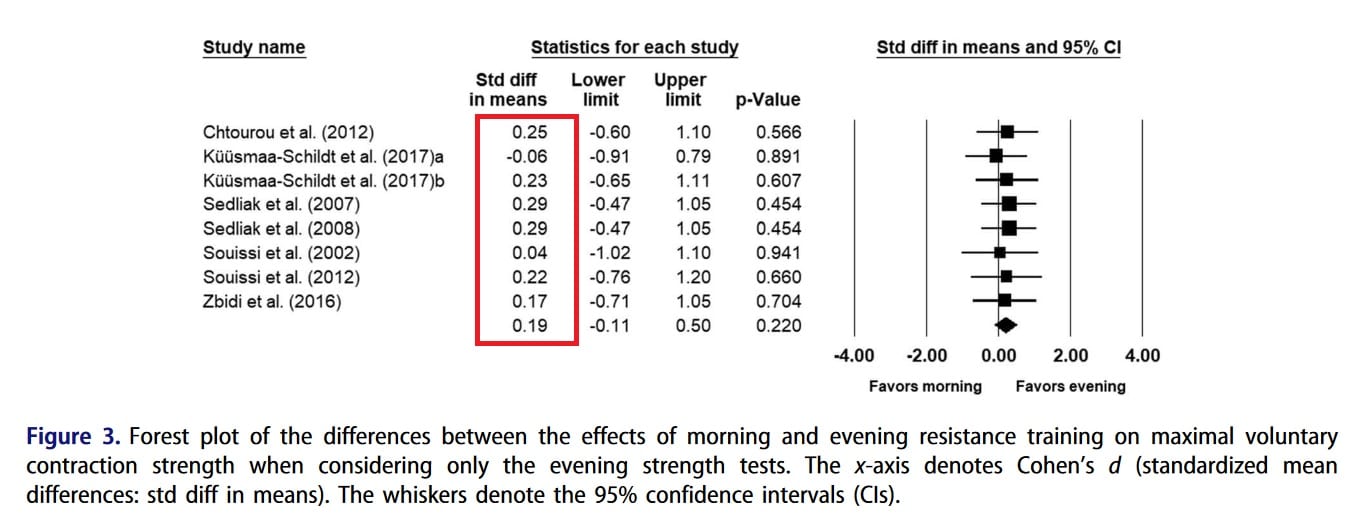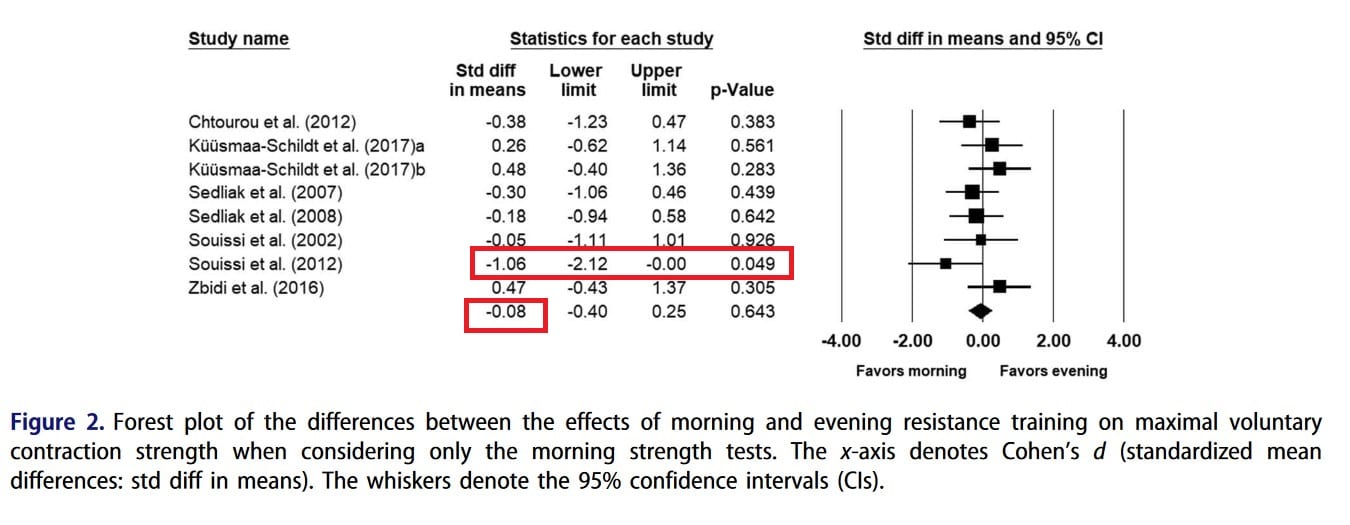Does it matter at which time of day you work out? [Study review]
Several years ago I wrote an article about the best time to work out. I discussed the importance of something almost nobody thought about for exercise: our circadian rhythm. Almost all systems in our body function on a roughly 24-hour schedule with peaks and valleys of activity. Our muscles are no different and thus our physical strength has a biorhythm: we are stronger at some times than other times. Since we perform better at some times than other times, our gains can also differ when training at different times. That’s the gist of the article. For a full review, I highly recommend reading the whole thing. This post will serve as an update of that article, as I’ll review a new meta-analysis on this topic by Grgic et al. (2019): “The effects of time of day-specific resistance training on adaptations in skeletal muscle hypertrophy and muscle strength: A systematic review and meta-analysis.”
The meta-analysis came to the following main conclusions:
“(1) at baseline, a significant difference in strength between morning and evening is evident, with greater strength observed in the evening hour;
(2) resistance training in the morning hours may increase strength assessed in the morning to similar levels as strength assessed in the evening;
(3) training in the evening hours, however, maintains the general difference in strength across the day, with greater strength observed in the evening hour;
(4) when comparing the effects between the groups training in the morning versus in the evening hours, increases in strength are similar in both groups, regardless of the time of day at which strength assessment is conducted; and
(5) increases in muscle size are similar irrespective of the time of day at which the training is performed.”
In short, the researchers concluded it doesn’t matter at which time of day you train, as long as you do consistently. That last part is crucial. I’ve seen some people conclude from this paper it doesn’t matter when you train. That’s not the case. This paper confirms we generally have greater strength higher in the evening, but it may not matter in the long run, because our biorhythms can adapt to our regular training time.
Many people have the idea that everyone has a fixed chronotype: some people are morning larks and others are night owls. I can speak from personal experience this is nonsense. The body can adapt to almost anything, at least to some extent. I probably have a condition known as non-24 (hard to diagnose, doctors came to different conclusions), which means my biorhythm is longer than 24 hours and if I don’t control it meticulously, it will advance onward and I’ll fall asleep 1-2 hours later every day. During summer breaks from college, this would indeed happen and at some point I’d meet my father in the morning when he woke up to go to work and I’d only then go to bed. When I started working as a business consultant, my biorhythm obviously had to adapt, so I learned to control my biorhythm with light exposure, nutrition, supplements and good lifestyle management. This worked exceedingly well and even though I’m no longer bound by office hours, I now still have a highly consistent bedtime of 12-to-8 and I’m most productive in the morning. I went from the most extreme night owl to a typical morning lark.
However, the body’s adaptive capacity has limits. A detailed look at the analysis changes the interpretation. Data quality was mostly mediocre, as the authors noted, there were only 11 studies and they were all in untrained individuals with only 1 study being longer than 12 weeks and 3 being as short as 6 weeks. The difference between training at different times won’t be night and day (no pun intended), so we have to look beyond hard statistical significance.
Strength
Look at figure 3 below. It shows the results of training in the morning vs. evening for evening strength level. While not statistically significant, all studies except 1 find greater strength gains in the evening when training in the evening. This is supported by the analysis that looks at evening vs. morning strength from evening training: evening strength gains were greater than morning strength gains. The one exception was nowhere near significant with only a tiny negative effect. The overall effect averaged 0.19 was the confidence interval spanning from -0.11 to 0.50, meaning roughly that evening workouts are at worst a little bit worse for evening strength than morning workouts, most likely at least a little better and possibly much better.

Similarly, average morning strength gains were greater – but not statistically significantly so – when training in the morning than in the evening: see the data below. In one study, this effect reached statistical significance.

Based on the above, I’d say strength gains are probably slightly time-of-day specific. Strength was measured as mean voluntary isometric contraction (MVC) in this analysis. This is a very static, brute force measure of strength. It’s plausible the performance of more technical, dynamic exercises such as squats is more time-specific. This is certainly my experience at least. I don’t know many powerlifters who train in the evening that can rival their evening squat 1RM in the morning. I therefore generally have the athletes that I coach, especially powerlifters, train at the time of day of their next competition. If you need to perform in the morning, you’ll probably want to train in the morning. If you need to perform in the evening, you’ll probably want to train in the evening. This lets your biorhythm adapt so you can achieve peak strength during your competition.
If you don’t compete, the difference in strength development is probably trivial.
Muscle growth
Only 5 studies measured muscle growth. Their data showed on average absolutely no difference in muscle growth between morning and evening training groups. However, I question the relevance of these studies for serious strength trainees interested in maximal muscle hypertrophy.
- One study by Souissi et al. (2012) was in 10-11 year old boys. Neither group of kids gained a significant amount of lean body mass, so it’s not surprising there was no difference between the groups either.
- Kr?márová et al. (2018) was in untrained, elderly women. This study probably confounds the analysis, as it found significant fat loss but not muscle growth in the evening group and significant muscle growth but not fat loss in the morning group. The evening group also achieved significantly better improvements in health markers. While no body composition measures differed significantly between groups, these results strongly suggest the evening group consumed fewer calories. Diets were not controlled.
That leaves 3 studies of actual interest.
- In Sedliak et al. (2009), quadriceps femoris muscle volume increased by 3.5% compared to 2.7% in favor of the evening group, but this difference did not reach statistical significance.
- Sedliak et al. (2018) found similar muscle growth in the evening and morning group, but this study was statistically underpowered to detect even a medium effect size. They couldn’t even find significant correlations between the different measures of muscle growth. The former study by these researchers only detected the effect after week 11, but this study was only 11 weeks in duration.
- Küüsmaa et al. (2016) is the only study in the analysis and total literature on this topic that lasted more than 12 weeks. It lasted 24 weeks even. Crucially, after week 13, muscle growth in the evening group significantly exceeded that of the morning training group.
If we ignore the 2 arguably irrelevant studies on boys and elderly women, we have 1 study in favor of evening workouts, 1 study tentatively hinting at a benefit of evening workouts and 1 underpowered study finding no difference in muscle growth. I’d say the literature thus favors evening workouts for muscle growth.
The authors of the new meta-analysis note that muscle anabolic signaling, specifically post-workout p70S6 phosphorylation, is the same in the evening and morning based on Sedliak et al. (2013, 2018), supporting it doesn’t matter at which time you train. However, they did not mention Burley et al. (2016), who concluded differently: “Timing of resistance training regimen in the evening appears to augment some markers of hypertrophic potential, with elevated IGFBP-3, suppressed cortisol and a superior cellular environment.”
Regardless of cellular mechanisms, the best study we have on muscle growth when training at different times found a significantly beneficial effect of training in the evening. Given the mediocre data quality of the literature as a whole, my conclusion is that if you can easily train in the afternoon or evening, that’s probably ideal for most people. Training in the morning can work well too, but for maximal results, you’ll probably need meticulous biorhythm control and strategic caffeine use, as per my previous article.
New meta-analysis reference
The effects of time of day-specific resistance training on adaptations in skeletal muscle hypertrophy and muscle strength: A systematic review and meta-analysis. Grgic et al. 2019. Chronobiology International. doi: 10.1080/07420528.2019.1567524
 Want more content like this?
Want more content like this?
Then get our free mini-course on muscle building, fat loss and strength.
By filling in your details you consent with our privacy policy and the way we handle your personal data.
